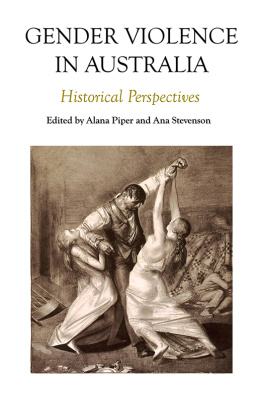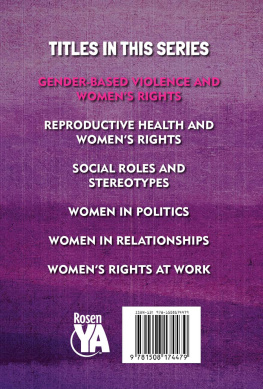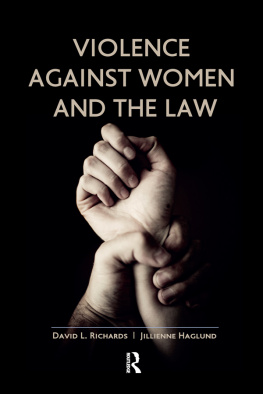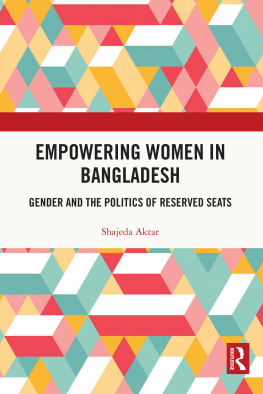
Women and Domestic Violence in Bangladesh
After the independence of Bangladesh in 1971, the country has experienced large-scale transformations owing to national and international migration, urbanization, the development of many national and international non-governmental organizations (NGOs) and economic dynamism. Globalization and economic liberalization have created opportunities to develop sustainable social policies by strengthening the national economy of the country. Major progress has been made in closing the gender gap, and the Constitution of Bangladesh provides equality of status and opportunity to all its citizens irrespective of sex. However, domestic violence perpetuated against women is a common phenomenon in Bangladesh.
This book is a study about domestic violence against women in Bangladeshi society. It delineates, in particular, why and how some women become the victims of domestic violence in the changing socio-economic setting of Bangladesh. The author explores the multiple contexts in which domestic violence occurs by focusing on the everyday experience of women subjected to this violence. The book shows how changing socio-economic setting, urbanization and the growing demand for female labor influences the phenomenon and experience of domestic violence. It demonstrates that domestic violence is entangled in a complex web of institutionalized social relations that necessitates a structural and contextual understanding of the production of such violence in family, kinship and gender relations. Finally, it identifies factors that cause, perpetuate, and mitigate domestic violence or give strength to women to struggle and raise their voices or take shelter in the law against the perpetrators of domestic violence.
A novel contribution to our understanding of how gender relationships are differently constituted and contested in the everyday lives of Bangladeshi women, both in natal and affinal families, this book will be of interest to academics in the field of Sociology, Gender and Law and South Asian Studies.
Laila Ashrafun is Professor in the Department of Sociology at Shahjalal University of Science and Technology, Sylhet, Bangladesh.
Routledge/Asian Studies Association of Australia (ASAA) South Asian Series
Edited by Duncan McDuie-Ra
The University of New South Wales, Australia
Published in Association with the Australian Studies Association of Australia (ASAA), represented by Ernest Koh, chair of the ASAA Publications Committee, Monash University, Australia.
Founded in 1986 to publish outstanding work in the social sciences and humanities, the SAPS entered a new phase in 2010 when it joined with Routledge to continue a notable tradition of Australian-based research about South Asia. Works in the series are published in both UK and Indian editions.
SAPS publishes outstanding research on the countries and peoples of South Asia across a wide range of disciplines including history, politics and political economy, anthropology, geography, literature, sociology and the fields of cultural studies, communication studies and gender studies. Interdisciplinary and comparative research is encouraged.
Suicide and Society in India
Peter Mayer
Women and Domestic Violence in Bangladesh
Seeking A Way Out of the Cage
Laila Ashrafun
Women and Domestic Violence in Bangladesh
Seeking A Way Out of the Cage
Laila Ashrafun
First published 2018
by Routledge
2 Park Square, Milton Park, Abingdon, Oxon OX14 4RN
and by Routledge
711 Third Avenue, New York, NY 10017
Routledge is an imprint of the Taylor & Francis Group, an informa business 2018 Laila Ashrafun
The right of Laila Ashrafun to be identified as author of this work has been asserted by her in accordance with sections 77 and 78 of the Copyright, Designs and Patents Act 1988.
All rights reserved. No part of this book may be reprinted or reproduced or utilized in any form or by any electronic, mechanical, or other means, now known or hereafter invented, including photocopying and recording, or in any information storage or retrieval system, without permission in writing from the publishers.
Trademark notice: Product or corporate names may be trademarks or registered trademarks, and are used only for identification and explanation without intent to infringe.
British Library Cataloguing-in-Publication Data
A catalogue record for this book is available from the British Library
Library of Congress Cataloging-in-Publication Data
Names: Ashrafun, Laila, author.
Title: Women and domestic violence in Bangladesh : seeking a way out of the cage / Laila Ashrafun.
Description: Abingdon, Oxon ; New York, NY : Routledge, 2018. | Series: Routledge/Asian Studies Association of Australia (ASAA) South Asian series ; 2 | Includes bibliographical references and index.
Identifiers: LCCN 2017059145 | ISBN 9780815367765 (hardback) | ISBN 9781351256643 (ebook)
Subjects: LCSH: Family violenceBangladesh. | Abused womenBangladesh. | Poor womenBangladeshSocial conditions.
Classification: LCC HV6626.23.B3 A84 2018 | DDC 362.82/92095492dc23
LC record available at https://lccn.loc.gov/2017059145
ISBN: 978-0-8153-6776-5 (hbk)
ISBN: 978-1-3512-5662-9 (ebk)
Typeset in Times New Roman
by Wearset Ltd, Boldon, Tyne and Wear
For my parents, my husband, Jasim, and my son, AnindyaGender-based violence confronts women throughout the world, but it is a topic that has only come to prominence relatively recently in the social science research. Women themselves are often diffident about admitting in public that they have been the victim of marital and other domestic violence. Law enforcement agencies are often as male dominated as the wider society, and they are often averse to intervening in matters that are generally perceived to be private. Domestic violence tends to be under-reported in police records, although surveys may provide ballpark figures of its incidence. This relative invisibility of domestic violence is particularly marked in Bangladesh and much of the global south more generally, where the collection vital statistics is often seriously incomplete and men and women alike tend to presume that husbands have the right to chasten their wives, including with physical violence if they see fit. Consequently, while we do know that domestic violence is extremely widespread, we still know relatively little about womens experience of domestic violence, how they develop coping mechanisms to survive and resist violence, and how they contend with agencies tasked with protecting them and ensuring their future security and well-being. It is onto this understudied terrain that I have chosen to direct my spotlight with respect to basti dwellers and a counseling center in Sylhet, Bangladesh.
This book began with the deceptively straightforward question: why and how do some women become the victims of domestic violence in the changing socio-economic setting of Bangladesh? It critically seeks to trace domestic violence against impoverished women in Bangladeshi society by paying keen attention to the different factors of inequality and subordination of women in their everyday lives. I have portrayed the position of womanhood in the lower socio-economic class in its social and cultural milieu. More specifically, I have shown the position of girls in lower socio-economic families and how the socialization of a girl is marked by tradition to make her a woman. I have studied how these women perceive and practice the stereotypical notion of gender relations, kinship and the marriage system in the patrilineal and patriarchal social structure. Hence, I have focused on how women are entangled with the dominant structural practice of the society. By the same token, I have also shown how some women become subjects and how their actions in practice contest the dominant structure.







